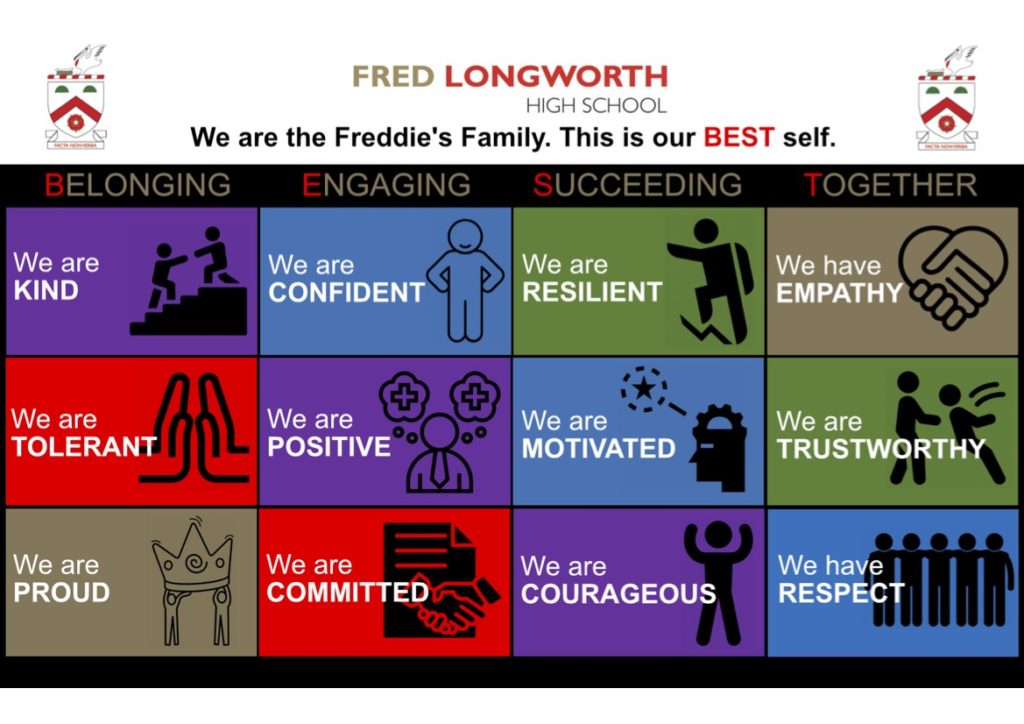Character - Positivity
‘Being constructive, optimistic, or confident. A desirable or constructive quality or attribute – “take your weaknesses and translate them into positives.”‘
Character - Positivity
‘Being constructive, optimistic, or confident. A desirable or constructive quality or attribute – “take your weaknesses and translate them into positives.”‘
Character - Positivity
‘Being constructive, optimistic, or confident. A desirable or constructive quality or attribute – “take your weaknesses and translate them into positives.”‘
Home > FLHS BEST Character Values > Character – Positivity
Over the next few weeks as part of our work on developing character we will be focusing on Positivity and the power of positive thinking – linking this to ‘how can we be even more effective and engage in learning at a higher level at Freddies’. Key information on ‘being positive’ is included below.

Some of the following information is provided from the website ‘Mayo Clinic’.
Positive
This can be defined as:
Being constructive, optimistic, or confident. A desirable or constructive quality or attribute – “take your weaknesses and translate them into positives.”
What is the meaning of being positive?
If you are positive about things, you are hopeful and confident, and think of the good aspects of a situation rather than the bad ones. ‘Having a glass half full as opposed to half empty’ is a well-used phrase about positive people.
What makes a positive attitude?
Having a positive attitude means being optimistic about situations, interactions, and yourself. People with positive attitudes remain hopeful and see the best even in difficult situations.
How could we stay positive?
You can learn to turn negative thinking into positive thinking. The process is simple, but it does take time and practice — you’re creating a new habit, after all. Following are some ways to think and behave in a more positive and optimistic way:
- Identify areas to change.If you want to become more optimistic and engage in more positive thinking, first identify areas of your life that you usually think negatively about, whether it’s work, your daily commute, life changes or a relationship. You can start small by focusing on one area to approach in a more positive way. Think of a positive thought to manage your stress instead of a negative one.
- Check yourself.Periodically during the day, stop and evaluate what you’re thinking. If you find that your thoughts are mainly negative, try to find a way to put a positive spin on them.
- Be open to humour.Give yourself permission to smile or laugh, especially during difficult times. Seek humour in everyday happenings. When you can laugh at life, you feel less stressed.
- Follow a healthy lifestyle.Aim to exercise for about 30 minutes on most days of the week. You can also break it up into 5- or 10-minute chunks of time during the day. Exercise can positively affect mood and reduce stress. Follow a healthy diet to fuel your mind and body. Get enough sleep. And learn techniques to manage stress.
- Surround yourself with positive people.Make sure those in your life are positive, supportive people you can depend on to give helpful advice and feedback. Negative people may increase your stress level and make you doubt your ability to manage stress in healthy ways.
- Practice positive self-talk.Start by following one simple rule: Don’t say anything to yourself that you wouldn’t say to anyone else. Be gentle and encouraging with yourself. If a negative thought enters your mind, evaluate it rationally and respond with affirmations of what is good about you. Think about things you’re thankful for in your life.
Why is it important to be positive?
Positivity is the best energy booster of all time. Having a positive mental attitude is one of the most important things to develop in life. More energy, better health, a greater chance at success, and an overall happier life all show just how important having the right attitude is.
Is your glass half-empty or half-full? How you answer this age-old question about positive thinking may reflect your outlook on life, your attitude toward yourself, and whether you’re optimistic or pessimistic — and it may even affect your health.
Indeed, some studies show that personality traits such as optimism and pessimism can affect many areas of your health and well-being. The positive thinking that usually comes with optimism is a key part of effective stress management. And effective stress management is associated with many health benefits. If you tend to be pessimistic, don’t despair — you can learn positive thinking skills.

